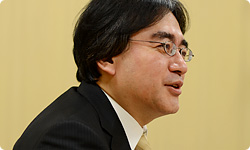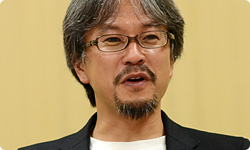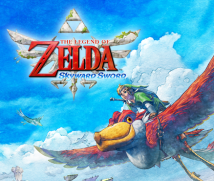3. Simple
"The design of this game is simple. I can’t say it enough. This Legend of Zelda game is simple. Simple in every way."
This is another deep comment. (laughs)
As this person says, the basic structure is simple. The role of each element is clearly defined. And the thoroughness of each one is...dense. (laughs)
Yes. (laughs) Precisely because of the simple structure, we could put in so much.
It’s simple and deep.
That’s right. I think that simplicity makes you feel you can play it over and over. Leaving the hub of the adventures, Skyloft, to go down to the surface feels so easy it’s like taking a little jaunt out into your neighbourhood. (laughs)
Iwata Asks: The Legend of Zelda: Skyward Sword You can just hop on down and have an adventure. 10Course selection screen in Super Mario: A screen on which players move a player-character across a world map to select a course to play. The system for travel in the sky game field in The Legend of Zelda: Skyward Sword is based on that concept.
The fact that we changed the save system this time must have something to do with it, too. Until now in The Legend of Zelda, you could always save anywhere, but when you started again, you were back at Link’s house or at the entrance to a dungeon, rather than where you saved. The point was that starting in a place you had already been through would help you grow accustomed to the world and feel as if you were proceeding smoothly.
That was the “Zelda method” up until now.
But then, if you lost to a dungeon boss, for example, and had to start all over at the beginning of that dungeon, you’d mostly just find that stressful. If you thought of a way to defeat that boss, you wouldn’t be able to try it out right away.
I see. So you devised a way to shorten that time cycle so you could try out what you had thought of right away.
That’s right. This time, we set save points at specific locations. It’s structured so you can try out all sorts of things from those points. That also led to simplicity.
This time, the trial-and-error mechanism, including the way to save, is done really well. In a simple step, you can try out your ideas right away, so you don’t feel stress in various scenes of the game. In the same period of time, you can do one thing after the other. That’s why you can have such a dense game experience in the same minute of play.
"The first version of this game that I played was the Japanese version, but I didn’t understand the Japanese at all. But when I played The Legend of Zelda: Skyward Sword, I wasn’t aware of that and played without any trouble. People use languages like English and Japanese to communicate, but in the world of The Legend of Zelda, that wasn’t necessary."
That comment is from someone in France. He said that even though he didn’t understand the words, he could tell what he should do next just from the character’s demeanor and other events taking place on the screen.
Aonuma-san, this is incredible. This is the comment that I would have never hit upon for myself without being told from a third party’s perspective. I mean, we’ve always thought that The Legend of Zelda was a game that you couldn’t do without a certain amount of verbal explanation.

Yes. As developers, we want to explain little by little what lies ahead and have the players move ahead as they figure it out. We thought it was impossible to convey that without words, but this time, it appears it got across without that.
It seems so.
But I suppose it got across and you can then enjoy its unfolding depths precisely because it’s so fundamentally simple. This reminded me of how important simplicity is in The Legend of Zelda.
It’s a tricky area for developers. There’s fear over whether that simplicity will satisfy the players, isn’t there?
Indeed, a lot is demanded of the Legend of Zelda series. I always worried that the players won’t be satisfied if it isn’t complicated.
Especially as the series builds up, it tends to get overwrought.
The developers think that a more sophisticated game will provide surprises and awaken the player’s inquisitiveness. But that isn’t necessarily true. At first glance, it appears contradictory, but I really learned that this time - like in The North Wind and the Sun. (laughs) (Editor’s note: The North Wind and the Sun is part of Aesop’s Fables. It tells the story of the North wind and the Sun competing to see who is strongest by trying to get a traveller to remove his cloak. The North wind’s mighty force just makes the traveller hold on to his cloak tighter, whereas the Sun’s persuasive rays cause him to take it off.)
Yes. (laughs) That’s a good example.
"People today enjoy short-term success and rewards. The Legend of Zelda: Skyward Sword provides that."
This is from someone at NOA.11 I think what we mentioned earlier about making it easier to start over is a big part of that. I think that matches the needs of people today. 11NOA: Nintendo of America.
And, you constantly experience moments of how fun it is to swing the sword, so you never get bored.
It’s true that you hardly ever feel like you’re being forced to do something. Especially overseas, they tend to demand a lot of freedom and don’t care much for RPGs with a single path forward. In the case of The Legend of Zelda: Skyward Sword, there may only be one path system-wise, but you never get the impression that there is no freedom.

Because each battle is full of freedom?
Yes, I think so. Loads of things shows up that you want to try. I think that’s important.
"When you play it, it looks similar, but it is clearly different, especially with regard to battles with Wii Remote Plus and the revolutionary item selection system."
"It’s all the same, and yet entirely different, from the previous Zelda games."
"I’ve never been very good at video games, so I’ve never completed one before. But this game tells you where to go next, with the Sheikah Stone videos to offer assistance, so I think more people will be able to play to the end."
"It’s a dream come true! Link can run! Enemies guard! (Unthinkable in The Legend of Zelda so far.) And travelling through the sky! There’s a high degree of freedom and it satisfies the desire everyone has to fly."
"The enemies have personality. They don’t just get defeated. They live and walk around and you can sense their desire to impede Link’s way."
"The player always feels as if he has true friends who will back him up. This game moved me more than any other I have played."
"Something different about the game is that some adults are hopeless."
I introduced them together, but these are all comments responding to the question of what is the same and what is different compared to previous Legend of Zelda games.
That last person continued with something funny, so I’ll introduce that, too.
"Among the NPCs [non-player characters], there’s Pipit’s mother who spends all the money her son saves doing night patrol, Owlan who tells his student who is running around to save Zelda that he is looking for a new species of plant as a hobby, and Jakamar who shows no sign of looking for his daughter who has disappeared."
Right, they’re are pretty hopeless. They have a lot of character! (laughs) But I can sense the love behind this comment.
In general, a lot of comments said the characters are incredibly charming.
I think the characters in the series have been plenty charming so far, so why do you think people say that is especially true this time?
As mentioned in the previous comment, I think the biggest reason is that aside from the regular characters that appear, you sense that the enemies have personality as well. A big part of that is the effect of their battle reactions, and how Fi provides these brief explanations, like how the Bokoblins are obsessed with underpants. (laughs) That’s just one of the playful elements we have included, but as a result, everyone gets a sense like “I bet this guy is like this.”
I see. Something else that surprised me is how everyone has their own feelings and how the points and details they mention are so different.
Yes, that’s right. Everyone’s comments are so different.
Everyone thinks fighting is fun, but when it comes to which characters they like or what things are good, they cheerfully mention all sorts of things. That is a really good thing. I’m happy about it.
